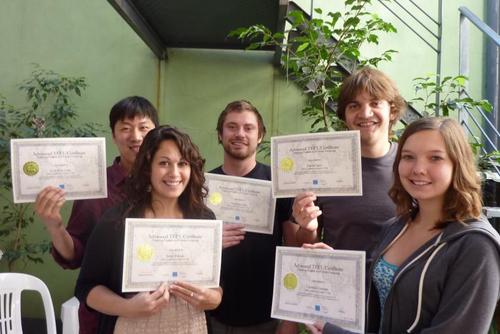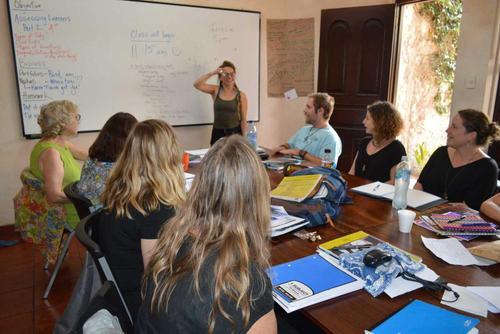If any of these sound like your daydreams, then you’re probably thinking of teaching English in South America. And who can blame you? With gorgeous locations, welcoming cultures and loads of TEFL jobs, South America is a great choice for TEFL teachers at the moment.
As with any great adventure it pays to be prepared, so to help you make the make the most of your South American dream, we’ve put together our top tips to prepare you for teaching English in South America.
1. Get Qualified

For sure South America is more chilled than others when it comes to qualifications (like Europe or the UK, for example), but that doesn’t mean that you shouldn’t be TEFL-qualified.
You don’t necessarily need a degree to teach in South America or have any teaching experience but your chances of finding a job without at least a TEFL certificate are slim.
Besides, doing a TEFL course is the best way to prepare yourself for making the magic happen in the classroom.
2. Bigger is Better
The first thing you need to decide is where you are going to go. In terms of finding a job in South America, bigger is better.
In other words, you are more likely to find a job in the bigger cities. A smaller town or village may offer a more authentic cultural experience but your chances of finding a job there are much smaller than in a big city where there are more students and more schools.
Once you have narrowed your decision down to a specific country, pick one of its big cities to start your quest. There are so many cities in South America to consider, Buenos Aires, Lima, Santiago and Rio de Janeiro are all good options.
3. Invest in a Good Pair of Trainers
You may be used to looking for and applying for jobs online, but in South America you will probably need to pound the pavements. Many schools expect you to be able to interview in person, so you will need to consider going to the country without a guaranteed job.
This may seem daunting, but this is the way it’s done around these parts. You can look online but don’t be surprised if you find employers prefer their teachers to be in the area already.
4. Watch What You Wear

When you find a school you want to apply at, make sure you are well-dressed when you drop in. Even though the culture may seem laidback and chilled, appearance is important so be aware of how you dress. (We were kidding about the trainers!).
Dress modestly and smartly and cover tattoos and body piercings as much as possible. This counts as much for when you pop in to drop off your CV as it does for job interviews.
5. Take Your Piggy Bank
Because you are arriving in the country without employment, this also means that you will need to arrive with enough money to support yourself for a while before you get your first paycheck. It may take a few weeks to find a job and even then it will be a few weeks until you are paid.
Happily, the cost of living in South America is pretty low so you won’t need to arrive with millions but bear in mind that you may need to pay a months’ deposit for rent and you may have travel expenses related to your job so factor that into your calculations.
6. Speak the Lingo

It’s a no-brainer to try and pick up the language of whichever country you are in, but this can be extended to include translating your CV into Spanish or Portuguese or the relevant language. You could also invest in business cards with your contact details.
There are flexible Spanish courses in South America available to book all year round which can be combined with any teaching job. You might also like to learn Portuguese in Brazil if the idea of working as a language teacher in an exotic location like Rio de Janeiro appeals to you.
7. Be Prepared to Teach Private Students
These business cards will come in handy when you are looking for private students, which is common in South America. If possible, wait until you have a local phone number before making the cards so that employers will be able to reach you easily. Then you can have them at hand to leave at libraries or on community noticeboards, or when you meet new friends.
8. And Business English
Business English is becoming very popular in big South American cities as their economies improve. Being a Business English teacher will make you a very attractive teacher for language schools, companies and potential private students.
What’s more, teaching Business English can earn you more money than teaching General English. Even if you don’t have any experience in the business sector, sell yourself as capable of teaching Business English and it will make your CV look that much better.
9. Don’t Expect to Become a Millionaire
While most of us become TEFL teachers because we are excited by the opportunities for adventure it will afford us, we still need to be realistic and think about finances.
When working in South America you will certainly make enough to live off and probably enough to live well – think beach getaways on weekends and eating out at restaurants during the week – but don’t count on making enough to pay off your student loan back home. Instead, your focus while living in South America should be on the experience of living in such an amazing destination.
10. When in Rome…
If you are able to put financial concerns to the back of your mind then this is the next step for you. When in Rome, do what the South Americans do…or something like that. South America is not only different geographically to many countries, but also culturally.
Embrace the culture and learn to live like a local, even if that might mean living at a slower pace than you are used to. Be prepared to be frustrated when things don’t happen as quickly as you would like them to.
That’s it. Our top ten tips for teaching English in South America. Keep these in mind and you’ll be all set for the South American adventure of a lifetime!
This is a guest post by The TEFL Academy who are one of the world's leading TEFL course providers. They can help you acquire the skills needed to teach English as a foreign language, whether it be through a specialist online or a combined TEFL course.
Related Pages








